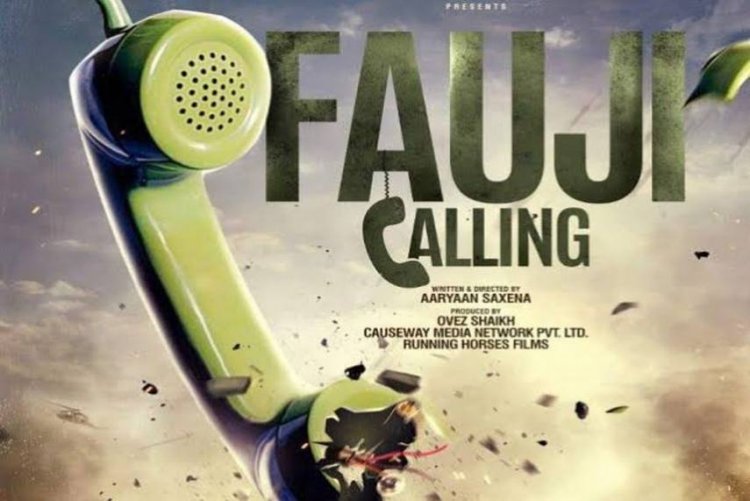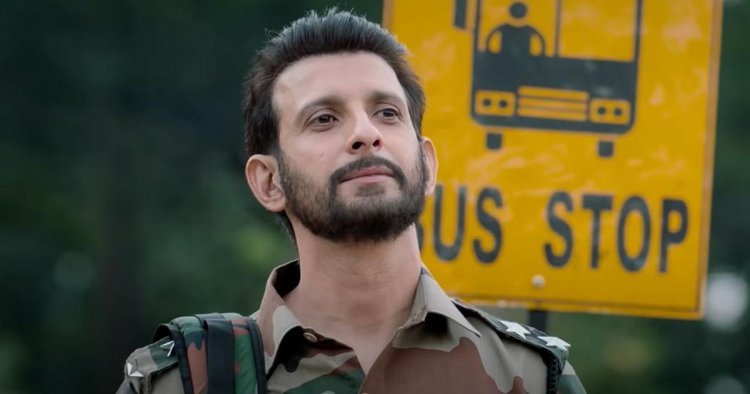Fauji Calling

Ratings: 2.5/5
Duration: 02 Hrs 14 Mins
Language: Hindi
Genre: Drama
Director: Aaryaan Saxena
Writers: Jimmy Satish Hasija, Aaryaan Saxena
Producers: Anil Jain, Ovez Shaikh, Vikram Singh, Vijeta Verma
Music: Mannan Munjal
Cinematography: Subhranshu Das
Editing: Praveen Angre
Production Company: Running Horses Films
Release Date: 12 March 2021 (India)
Released: In Theatres
Star Cast: Bidita Bag, Sharman Joshi, Mugdha Godse, Zarina Wahab, Mushtaq Khan, Vikram Singh, Mahi Soni, Rizwan Kalshyan, Apurba Panda, Ashish Londhe, Siddhi Anil Jain, Ritu Shree, Abhijita Kashyap, Anil Chouhan
Plot: The film ‘Fauji Calling’ is about soldiers who sacrifice their life for the country. It is also about their family’s struggles in their absence, which they have to face, along with getting over their situations.
The film tells the story of Rajveer Singh (Vikram Singh), who is a soldier, a happy family man who has a loving wife Sakshi (Bidita Bag), a sweet little daughter Aaradhya (Mahi Soni), and a mother (Zarina Wahab).
The plot hinges principally on Aaradhya, who falls ill after she is rattled by a nightmare, in which she sees her father being felled by a bullet. The doctor tells the family that the girl has PTSD (post-traumatic stress disorder) and needs to be handled with care.
Her mother and grandmother, who live in a rural part of Jharkhand, do all they can to disavow her of her fears. But as the girl's premonition comes true, what the two older women do to conceal their distress forms the crux of the story.
Review: There are ‘war films’ and there are films on ‘war heroes’, but are there films that really showcase the plight of the families of the Jawaans? Not really. Therefore, director Aaryaan Saxena has narrated such a story through ‘Fauji Calling’ that adopts an unusual approach to the theme of war and martyrdom, by swinging the focus away from battlefield heroics and directing it towards those that soldiers leave behind. Hence, it is a very different story in terms of narrative.
Though ‘Fauji Calling’ has several battle scenes, eventually it is about the human dimensions of war. A part of the story is told through the innocent perspective of a little girl, while another part is from the standpoint of a bereaved wife. However, the narrative is sluggish. It moves at its own pace, making it difficult for the viewers to connect with the reel action.
In short, the film has an unimpressive first half that is as dull as anything can be! Moreover, most of the big moments or twists fail to strike a chord. However, the attraction is the little girl Mahi Soni. She is easily the ‘hero’ of the plot as she steals the show and gets the maximum attention.
The rest of them, including Sharman Joshi, Zarina Wahab, Vikram Singh, and Bidita Bag, probably followed the director’s vision and just passed the muster. The role of Fauji is played by Vikram Singh who has also produced the film under his home banner ‘Running Horses Films’.

Bidita Bag in the role of a wife is good. Zarina Wahab has also been fine in her character. Sharman Joshi's entry takes place in the second half of the film. He makes his presence felt despite not being the star of the movie, and does justice to the emotional sequences, and makes ‘Fauji Calling’ a lot more watchable! Even Mugdha Godse has a tiny role too, and she performs as expected from the part.
Overall, the quality of the filmmaking is ordinary. Despite the unblemished camerawork by cinematographer Subhranshu Das and the steadily competent performances from Sharman Joshi, Bidita Bag, Zarina Wahab, and newcomer Mahi Soni, the film never gets within striking distance of anything that could be deemed to be above average.
The editing, especially in the first half is not up to the mark. The songs have a situational appeal and gels with the narrative. While the background score fails to elevate the narrative, the other technical aspects have been handled with a certain degree of competence.
‘Fauji Calling’ would have carried more weight, if only it had a way of handling the tools of the medium more imaginatively and less soppily!















































